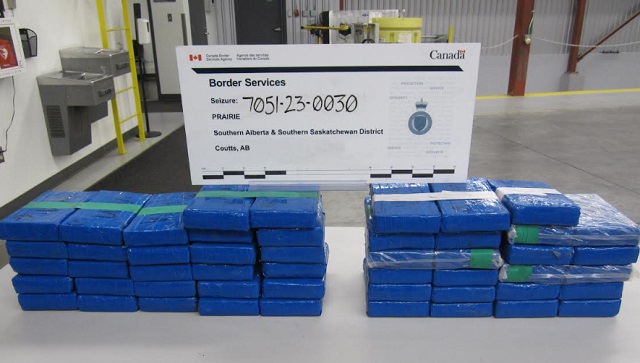Alberta
RCMP charges Calgary resident for importing nearly $3 million in cocaine

News release from Alberta RCMP
The Integrated Border Enforcement Team (IBET), a joint force operation between the RCMP, Canada Border Services Agency (CBSA) and Calgary Police Service, has charged a Calgary resident for drug importation and trafficking.
On Nov. 19, 2023, CBSA officers discovered and seized 52 kg of cocaine following a secondary examination of a commercial truck trailer at the Coutts border crossing. The drugs, which have an approximate value of $3 million, were seized from the trailer and were referred over to IBET for further investigation.
Kamalpreet Singh, 28, a resident of Calgary, was charged with the following offences:
- Importation of a Controlled Substance contrary to section 6(1) of the Controlled Drugs and Substances Acts; and,
- Possession of a Controlled Substance for the Purpose of Trafficking contrary to section 5(2) of the Controlled Drugs and Substances Act; and,
- Smuggling into Canada contrary to section 159(1) of the Customs Act.
Singh is scheduled to appear in Lethbridge Provincial Court on Jan. 2, 2024.
“As a result of the strong working relationship between agencies in this joint force operation, we successfully disrupted the importation and trafficking of harmful drugs into Canada.”
- Supt. Sean Boser, Officer-in-Charge of Federal Policing – Calgary, RCMP
“The safety and security of Canadians is our government’s top priority. By stopping illegal drugs at the border, we’re reducing the risk of harm to Canadians and keeping our communities safe. This seizure is another example of the ongoing cooperation between the CBSA and the RCMP in protecting Canadians.”
- Janalee Bell-Boychuk, Regional Director General, Prairie Region, Canada Border Services Agency
“As law enforcement agencies, a top priority of our collaboration is public safety. Working together, we have prevented another large quantity of illicit drugs from reaching our city and communities across Alberta, which in turn has prevented criminal activity associated with the drug trade. This continued success proves how important our partnership is to maintaining safety for all Albertans.”
- Supt. Cory Dayley, Criminal Operations and Intelligence Division, Calgary Police Service

IBET’s mandate is to enhance border integrity and security along the shared border, between designated ports of entry, by identifying, investigating and interdicting persons, organizations and goods that are involved in criminal activities.
Alberta
Tell the Province what you think about 120 km/h speed limit on divided highways

Alberta’s government is engaging with Albertans on increasing speed limits on rural highways.
Starting Nov. 7, Albertans can share their views on modernizing speed limits on divided highways through an online survey running until Dec. 12. The survey will ask how Albertans view raising the speed limit by 10 km/h on various highways from 110 km/h to 120 km/h.
“Alberta’s government is investigating how to safely increase speed limits on divided highways, and if Albertans support increasing speed limits. We are investing more than $1.5 billion this year alone to improve highway safety and upgrade infrastructure across the province. We want Albertans to be able to drive the speed limit that the highways are designed for. Modern vehicles combined with public awareness mean we can explore higher speed limits.”
The survey will provide Albertans with the opportunity to provide input on which highways they would prioritize having a speed limit increase, their views on restricting commercial trucks from using the far-left lane on highways with three or more lanes and any other feedback that would improve driving experiences on provincial highways.
Following a review of the survey results, Alberta’s government plans to conduct a mini-trial of a 120 km/h speed limit to assess the impacts of higher speed limits on divided highways. The trial will include strong monitoring to assess driving behaviour.
Alberta’s government reminds motorists to slow down and drive to the conditions. Speed limits are set for ideal conditions. When roads are wet, icy or when there is reduced visibility, motorists should slow down.
Quick facts
- Alberta’s provincial highway network includes more than 64,000 lane kilometres of highways, about 11,700 lane kilometres of which are divided.
- The posted speed limits of Alberta’s divided highways range from 100 to 110 km/h, although the posted speed limits on segments passing through cities, towns and First Nation lands can be as low as 50 km/h due to factors such as signalized intersections, pedestrians and local access.
Related information
- The survey is available online.
Alberta
Alberta Announces Members of Class Size and Complexity Committee

A new Class Size and Complexity Cabinet Committee has been struck to address classroom challenges.
Taking action on class size and complexity
Classrooms in Alberta continue to grow and are becoming increasingly complex, and immediate action is needed to address these issues in the public education system. To meet these issues head on, the Class Size and Complexity Cabinet Committee has been created. The cabinet committee will help guide government policy and deploy resources to deal with class sizes and classroom complexity.
“We are committed to providing world-class education, and we’re building schools and funding education at a rate unprecedented in this province. This committee will help us address the concerns of teachers, parents and students around class sizes and complexity.”
Throughout November, Alberta’s government will continue work with school boards to collect data on class sizes and classroom composition. The cabinet committee will use this data to direct resources to the classrooms that need it the most. Starting in January, this data will be made available and released annually.
The Class Size and Complexity Cabinet Committee will be co-chaired by the Premier of Alberta and the Minister of Education and Childcare. It will also include non-voting members representing school boards, administrators and a teacher representative of the ATA. The committee will also hear from school boards, academic experts, teachers, educational assistants, complex needs specialists and parents to inform its decisions and guide this vital work.
“We heard teacher concerns, and we are providing solutions. The Class Size and Complexity Cabinet Committee will help us take immediate action and ensure teachers and students are given the support they need to succeed.”
In June 2025, Alberta’s government established the Aggression and Complexity in Schools Action Team to provide advice on addressing classroom complexity. The report has been received and will be released soon. Over the coming months, the cabinet committee will start rolling out solutions informed by the action team’s recommendations. In addition, the committee will guide the creation of a new inclusive education policy framework.
“The work of this committee will support teachers in responding to the growing complexity in our classrooms. We will ensure that the voices of the contributors to the initial work guide
solutions that truly improve the educational experience for students and the educators who serve them.”
“I appreciate the government’s recognition of the impact of classroom complexity and their commitment to working collaboratively for improvement. Supporting teachers ultimately improves classroom conditions and student outcomes.”
Using data collected, this cabinet committee will also guide Alberta’s government in executing its commitment to hire 3,000 new teachers and 1,500 new educational assistants over the next three years. They will also assist in identifying and prioritizing where new schools and modulars should be built, advancing the government’s commitment to invest $8.6 billion to build 130 new schools, and provide 109 modular classrooms in the growing communities that need them urgently.
Quick facts
- Members of the Class Size and Complexity Cabinet Committee include:
- Danielle Smith, Premier of Alberta
- Demetrios Nicolaides, Minister of Education and Childcare
- Jason Nixon, Minister of Assisted Living and Social Services
- Rick Wilson, Minister of Mental Health and Addiction
- Searle Turton, Minister of Child and Family Services
- Lynnette Anderson, chief superintendent, Edmonton Catholic Schools
- Nicole Buchanan, chair, Red Deer Public Schools
- Marilyn Dennis, former president of Alberta School Boards Association
- Mike McMann, superintendent, Fort Vermilion Schools and President, College of Alberta School Superintendents
- Joanne Pitman, chief superintendent, Calgary Board of Education
- Dr. Elissa Corsi, Alberta Teachers’ Association
- Only Cabinet members are voting members. Additional guests will be invited to attend and share their expertise at the discretion of the chairs.
- School boards will be required to submit data on Alberta classrooms by Nov. 24.
-

 Business2 days ago
Business2 days agoCarney budget doubles down on Trudeau-era policies
-

 COVID-192 days ago
COVID-192 days agoCrown still working to put Lich and Barber in jail
-

 Business2 days ago
Business2 days agoCarney budget continues misguided ‘Build Canada Homes’ approach
-

 Business2 days ago
Business2 days agoCarney’s Deficit Numbers Deserve Scrutiny After Trudeau’s Forecasting Failures
-

 armed forces1 day ago
armed forces1 day agoIt’s time for Canada to remember, the heroes of Kapyong
-

 International2 days ago
International2 days agoKazakhstan joins Abraham Accords, Trump says more nations lining up for peace
-

 Also Interesting2 days ago
Also Interesting2 days agoAlberta Puts Player Safety First in Upcoming iGaming Launch
-

 Alberta1 day ago
Alberta1 day agoAlberta Announces Members of Class Size and Complexity Committee







